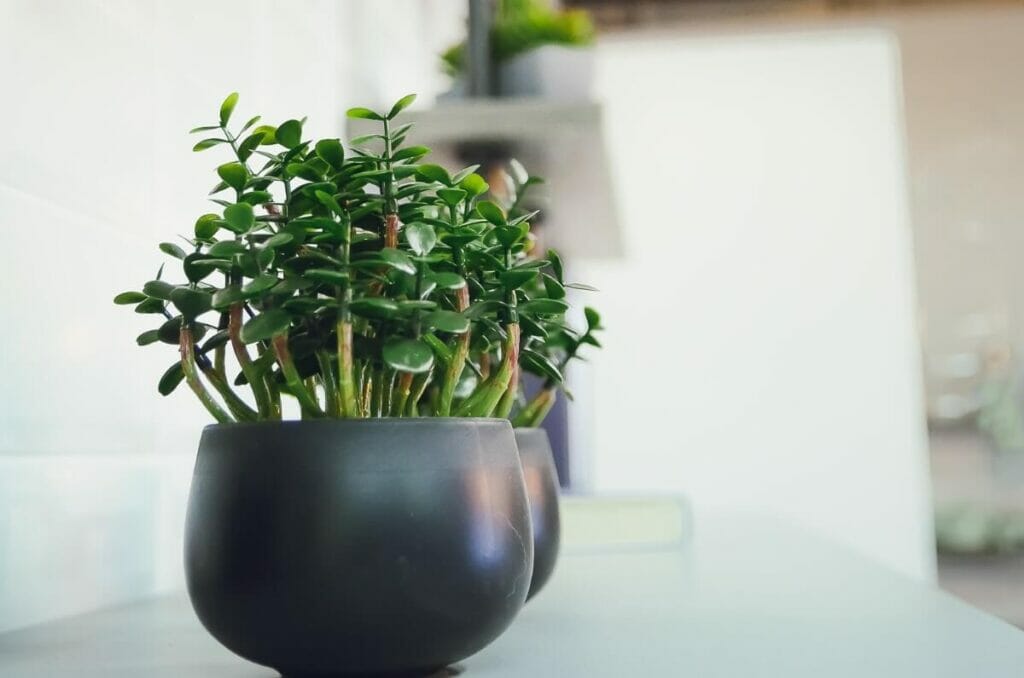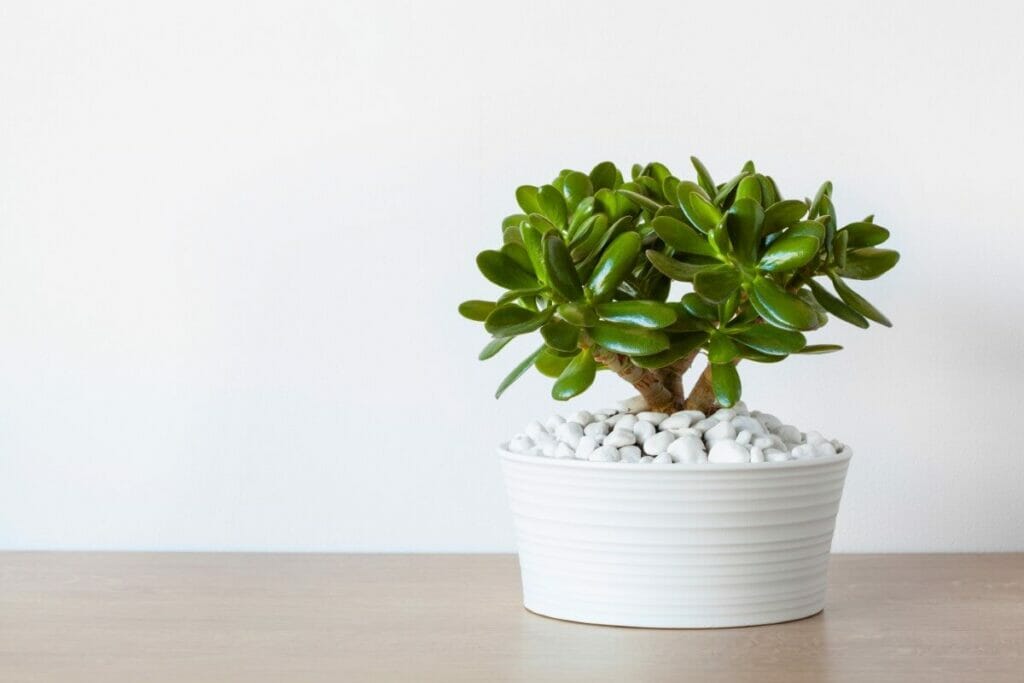Jade Plants: 11 Reasons They’re More Than Just a Pretty Plant
Jade plant (Crassula ovata) benefits don’t stop at their ornamental value. These beauties also boast positive feng shui powers, as well as the helpful ability to purify the very air around us. I’ve loved growing jade plants at home, and in this guide, I’ll run through 11 amazing uses and benefits that might just make you want to consider adding one to your own plant collection.

The Benefits of Jade Plants
1) Jade Plants May Improve Air Quality
Ever since NASA’s Clean Air Study in 1989, scientists have investigated how plants can purify our air. Our homes can contain invisible airborne chemicals like VOCs (Volatile Organic Compounds). Everyday household products and furnishings produce these hazards. Exposure to VOCs may increase our risk of developing conditions like asthma or even cancer.
But plants can actually absorb these compounds like they do with CO2. And a recent study by a New York University found that jade plants are one of the most effective houseplants for removing VOCs. In particular, jade plants scored well for removing acetone and toluene.
So not only are jade plants attractive for the home, but they’re also good for our health. Sounds like the perfect excuse to us.
2) Jade Plants Can Reduce Stress Levels

Mental health is becoming a more significant concern for many of us. And stress is one of the biggest causes of poor mental health. Thankfully, jade plants may help to reduce our stress levels.
One study found that interacting with plants rather than slaving away at a computer can reduce our stress response. The blood pressure and stress levels of 24 young men were measured while they performed two tasks. One was a computer-based exercise, while the other activity involved repotting a plant.
The participants who repotted the plant displayed lower blood pressure levels and felt calmer. By contrast, those that were doing the computer task showed spikes in their heart rate and higher blood pressure levels.
3) Jade Plants Can Foster Positive Feng Shui

Cultivating positive feng shui in your home can create a sense of harmony and positivity. Certain feng shui approved plants can help you harness those good vibes in specific ways. Like the jade plant, many plants have certain associations and symbolism within feng shui.
Many feng shui practitioners believe that jade plants represent prosperity, good fortune, and wealth. As sun-loving plants, jade plants grow best in southeastern corners. This is ideal because feng shui associates the southeast with prosperity and wealth. It’s a match made in heaven.
4) Jade Plants Are Attractive Features
Although they are succulents, most types of jade plants can grow to look like attractive miniature trees. This makes them great ornamental plants for sunny rooms or windowsills. Jade plants have beautiful deep green foliage with a distinctive oval-shaped appearance.
Jade plants can reach impressive sizes, even as houseplants. Over many years, a Crassula ovata might reach up to six feet tall. However, it’s more likely that they could reach a maximum of three feet in ideal conditions in the home.
But if you want to keep them compact, jade plants can also be used for bonsai. Crassula ovata are excellent beginner bonsai plants because they’re easy to prune and are very hardy.
However, bonsai jade plants can be confused with the similar but unrelated Portulacaria afra, the dwarf jade plant. This variety is used more traditionally as a bonsai tree.
5) Jade Plants Might Help You Sleep

It may sound far-fetched, but jade plants might be able to help you sleep soundly. Studies have shown that plants may perform beneficial functions in your bedroom.
In 2019, Chinese scientists explored how plants could affect sleep for astronauts. When the astronauts looked at a plant or were able to smell one while trying to sleep, their stress levels were lower. The participants also displayed more regulation in their nervous system. This builds on findings from other studies.
As mentioned earlier, jade plants can also remove harmful VOCs from the air. This reduces the number of contaminants in your bedroom, which can also help you sleep better. Let jade plants give you peace of mind for a good night’s sleep.
6) Jade Plants Are Easy to Care For
Jade plants bring lots of benefits to your home, but they also don’t require that much care as payment. Because they’re used to harsh conditions, jade plants thrive in the sheltered surroundings of our homes.
As succulents, jade plants don’t require a lot of water, which can be good for your bills. You should only water them every fortnight or so. Jade plants like well-draining potting soil and warmer temperatures – around 55 to 75ºF (12 to 24ºC) are perfect. Jade plants do need plenty of sunlight, though – at least four to six hours a day, preferably in the morning (too much afternoon light can lead to yellowing jade plant leaves).
These great succulents grow pretty slowly, so you won’t have to prune them too much. They don’t demand a lot of fertilizer either, making them an excellent hands-off plant for anyone with a busy schedule. Jade plants also don’t have too many issues with common pests and diseases.
7) Jade Plants Might Help You Be More Productive

While your manager might say otherwise, bringing some life into the workplace can make you more productive. And because they’re usually small and discreet, jade plants are ideal for this.
Research from 2014 evaluated office environments in the UK and the Netherlands. The scientists measured productivity levels once when the room was without plants and once again when plants were present.
When the office contained a plant, the participants were shown to be 15% more productive. It sounds like a good reason to add a jade plant, in our opinion. And if your boss complains, say that you’re trying to boost the prosperity of the office.
8) Jade Plants Can Help Increase Interior Humidity
Although we like to control the temperature indoors, humidity is also essential. Most homes should have humidity levels ranging from 30 to 50%, according to the National Asthma Council for Australia. Jade plants and other houseplants can help us reach this level.
If the air inside our home is too dry, we can be at greater risk of developing respiratory issues like asthma. Dry air is also not good for our skin, potentially causing eczema and cracked lips.
As houseplants siphon water from their pot, they release excess moisture into the air. This often happens through the foliage. Also known as transpiration, this process helps keep our homes at the right humidity level.
9) Jade Plants Are Easily Propagated

You can maximize the benefits of jade plants by propagating more. These superstar succulents are easy to propagate using cuttings. You can even propagate them by using just one leaf. But the easiest way is to take a stem cutting.
Choose a stem that’s a few inches long with several leaves and some visible nodes on the stem. Make a clean cut and trim away the lower leaves. You can then place the cutting in a jar of water or in some potting mix to root.
Once the roots measure an inch or two, the cutting is ready to be potted up and grow.
10) Jade Plants May Improve Indoor Acoustics
An unassuming jade plant isn’t the first thing that comes to mind when thinking of soundproofing. But plants have been shown to help improve acoustics in our homes. This helps reduce the impact of loud noises and unpleasant sounds.
Researchers in South Korea pitted a peace lily and a monkey puzzle plant against paper-based soundproofing to test this. Their results showed that the plants were more effective at reducing noise levels across a range of frequencies.
Plants make pretty good soundproofing because of their density. As soundwaves travel through the air, they’re absorbed by the stems and leaves of plants. Jade plants have pretty thick stems and leaves, so they might even be able to soak up more soundwaves.
So the lesson is clear – cultivate jade plants, and you might also cultivate peace and quiet.
11) Jade Plants Can Help Combat Allergies

As we’ve seen, jade plants and other species are good at filtering out harmful things like VOCs from the air. But there’s another benefit to this as well.
Plants that can improve the air quality are also beneficial for anyone with allergies. Jade plants can help filter out compounds and materials that trigger a range of common allergies, including asthma. Unfortunately, many household products these days contain things that can exacerbate specific allergies.
Jade plants and other purifying plants also extract dust and pollen from the air. These particles are common causes of ailments such as asthma and hay fever. So if you suffer from allergies, give jade plants a try.
Wrapping Up
Throughout this list, we’ve covered a lot of surprising benefits of jade plants. These plants look gorgeous, but they can also make us feel healthier and happier.
Jade plants can help filter out harmful chemicals from our air, reducing our risk of cancer and other issues. They can also help our mental health, making us feel calmer and more productive. Jade plants might even be able to help us get a good night’s sleep.
And, of course, jade plants are excellent feng shui plants for the home. They symbolize good fortune and financial success. Sounds like a winning combination to us.
For more, see our in-depth guide to jade plant care at home.
Andrew is the Editorial Director at Petal Republic. He holds a BSc degree in Plant Sciences and has trained professionally at leading floristry schools in London and Paris. In amongst overseeing a global editorial team, Andrew's a passionate content creator around all things flowers, floral design, gardening, and houseplants.
